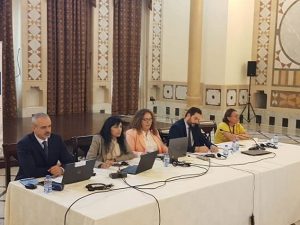
26/05/2022
With the support of the European Union, the country is putting the security of its critical infrastructure and the need to create a national security system on the table
Terrorism remains one of the greatest threats to Lebanon’s national security, and because of that, the European project ACT for Lebanon Security, co-led by FIIAPP, has organised a National Conference on Critical Infrastructure. The conference aims to strengthen Lebanon’s capabilities by creating a national system on Critical Infrastructure and its protection against deliberate aggression and terrorist attacks.
The Secretary General of the Lebanese Council of Ministers, Judge Mahmoud Makieh, the Spanish Ambassador to Lebanon, Jesús Ignacio Santos, and the representative of the European Union Delegation in Lebanon, Ingeborg Zorn, opened the event together with the ACT for Lebanon Security project team. In their speeches, Santos and Zorn stressed that the protection of these infrastructures must become one of the strategic priorities of the country’s national security.

The Director of the Spanish National Centre for Infrastructure Protection and Cybersecurity (CNPIC), Commander José Luis Pérez, and the Head of International Relations, Chief Inspector Beatriz Antón, have presented the Spanish model. This is one of the most developed infrastructure protection systems in the European Union and the aim is to transfer good practices and lessons learned for the construction of the Lebanese system.
The conference was also attended by representatives of the main governmental and security bodies: Ministry of Justice, Finance, Internal Security Forces, Lebanese Armed Forces, General Directorate of General Security, General Directorate of State Security, Lebanese Bank and the Lebanese University.
ACT – Advance Counter-Terrorism for Lebanon Security is a project funded by the European Union and led by FIIAPP in consortium with CIVIPOL and Arma dei Carabinieri. Under the umbrella of this project, the EU assistance aims at building the Lebanese national capacities to react to the threats of terrorism and organized crime and it assists the country in its policy to increase the resilience to cyber risks, while promote a rights based approach over terrorism cases.



